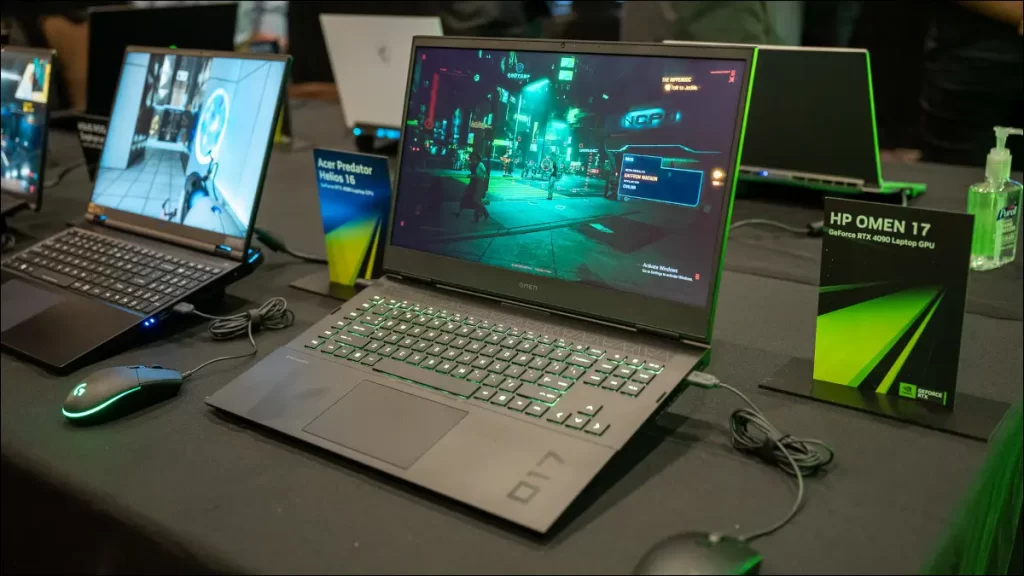
In PC gaming, you have a choice between a gaming desktop or a laptop. However, it’s not always clear which one of these options is the right one for you. Before you buy, get to know the key differentiators.
Performance
When it comes to gaming, performance is critical. You want a system that can handle even the most demanding games and applications without lag or slowdowns. So, when deciding between a gaming laptop and desktop, it’s essential to consider the performance differences.
Gaming laptops are designed to be portable and energy-efficient, so they usually use mobile versions of CPUs and GPUs. While these components are still powerful, they may not match their desktop counterparts’ processing power and graphics capabilities. As a result, gaming laptops can’t run some games at the highest settings or achieve the same frame rates as the best desktop systems.
That being said, modern gaming laptops have come a long way in recent years and can still deliver a great gaming experience. In practice, the actual sacrifices in games are relatively minor, and most mid-range gaming laptops today are as fast as the typical desktops PC gamers actually use, rather than the niche high-end rigs so few people actually have.
Apart from offering the highest performance components in absolute terms, desktop gaming PCs’ main advantage is performance per dollar. The desktop equivalent of a given gaming laptop will usually cost significantly less. So although you’ll get the same gaming experience with both performance-matched systems, you’ll be paying a premium for the laptop form factor and mobility.
However that price gap has been shrinking steadily, and you may find that the space-saving, portability, and power consumption perks of a gaming laptop may actually make the few hundred dollar premium versus an equivalent desktop more attractive than you might think.
Price and Value
That leads us neatly into the discussion of the price and value of gaming laptops and PCs. Price is simple enough to discuss, but value is highly subjective. What’s valuable to one person isn’t worth much to the next. So a PC gamer who only ever games at their desk, doesn’t care about how large their PC is, has no concern for power bills, or isn’t interested in the unique advantages of gaming laptops will find little of value.
Let’s look at a practical example, with the 2022 ASUS ROG Strix G15 equipped with an AMD Ryzen 7 6800H and a RTX 3060 laptop GPU. Apart from the somewhat limiting 6GB of VRAM, this is a computer that’s roughly in the same performance bracket as current-generation consoles if you look at raw GPU compute, before taking its additional ray tracing performance and access to DLSS technology into account. It’s not a perfect comparison, but you’re playing in the same league here.
A current-generation console costs $500, which means the price difference is around $700 to get a similar gaming experience, but with the various perks of PC gaming. A decent non-gaming laptop is going to come in at around $500 to $700 as well, and you don’t have to buy a monitor or TV if you don’t want to. This is just one example of how the value of a gaming laptop can be good, depending on your needs and how you look at it.
Should I Buy a Gaming Desktop or Laptop?
As you can tell, it’s no longer a straightforward decision when it comes to gaming desktops vs. laptops. Thanks to technological improvements, various market factors affecting desktop component prices, and changes to how many gamers like to engage with the hobby, much of the accepted wisdom around gaming laptops no longer apply.
That being said, if you do not need the specific and unique advantages gaming laptops have in terms of mobility, versatility, power consumption, and space-saving, you shouldn’t buy one. If you only ever play PC games at your desk or any other permanent spot, a gaming laptop makes no sense.
In that case, it’s safer to stick to desktop PC gaming. Especially (and somewhat paradoxically) if you’re on a tight budget or you care about having the absolute best gaming performance that money can buy. PCs serve both ends of that spectrum incredibly well.
It’s in that mid-range $1000 to $2000 segment where things really get fuzzy. Gaming laptops in this price bracket have the performance of powerful mid-range modern gaming PCs, but all the perks of a work laptop or to an extent professional workstation laptops for content creators and other power users. If you fall into that sweet spot, you should seriously consider a gaming laptop as one device that does it all for you.

